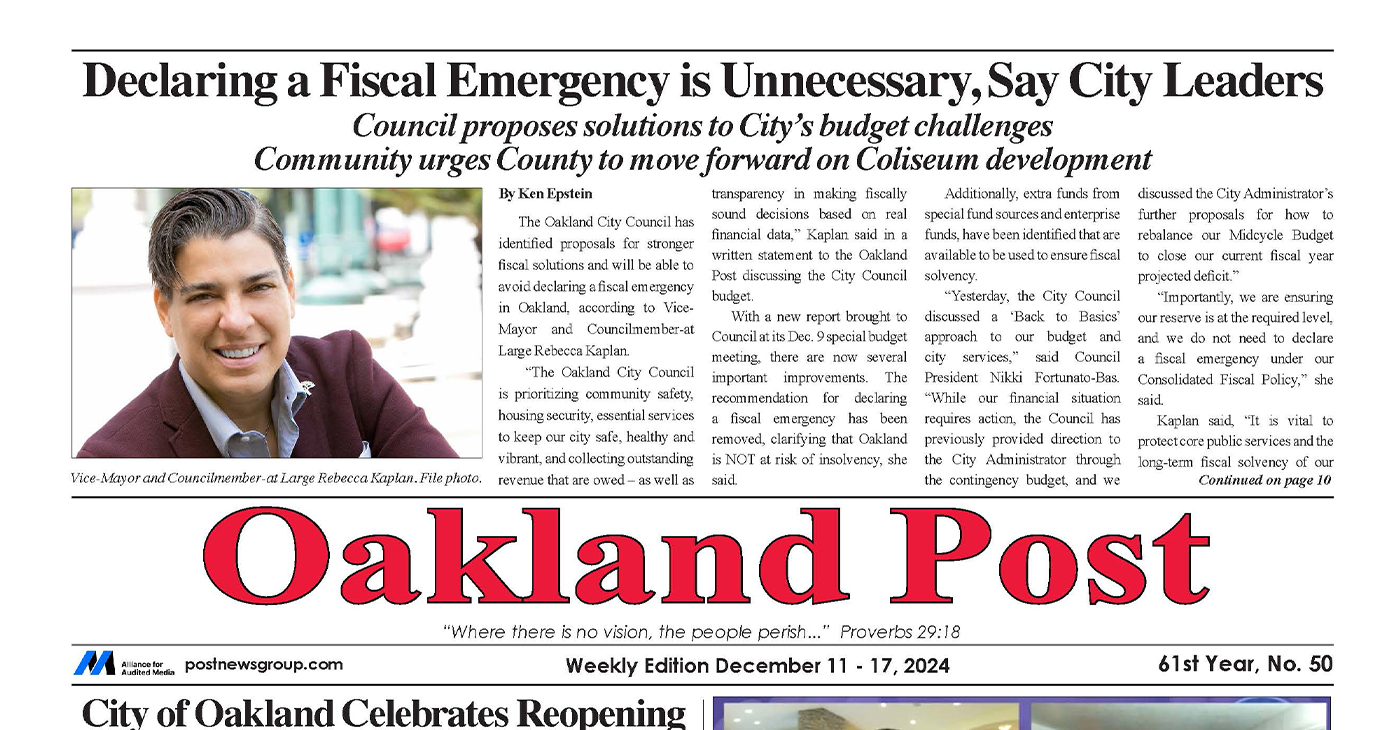Business
Coming Soon to California: A ‘Zero-Fee’ Public Banking Option
Proponents of public banking in California say Wall Street banks have failed low-income communities, particularly people of color. They also say the public banks will provide easier access to capital that will be critical to helping small businesses and neighborhoods rebound after the pandemic.

On October 4, Gov. Gavin Newsom signed legislation paving the way for a new public banking system in California.
AB 1177, known as the ‘California Public Banking Option Act,’ creates a zero-penalty, zero-fee, and zero-minimum-balance platform for basic financial services.
These services include direct deposit from employers and public benefits, automatic bill pay to registered payees, recurring payments and donations to account holders’ organizations or charities of choice, and an infrastructure to support account holders in building credit.
“AB 1177 will help Californians stay protected from overdraft fees and penalties and give them an opportunity to save money and build wealth while fighting the racial wealth gap,” said Assemblymember Miguel Santiago (D-Los Angeles), lead author of the bill.
“California is leading the nation’s public banking movement and we must keep working to provide no-fee banking services to all Californians,” he added.
Santiago wrote the bill with the intention to help close the financial services gap that leaves 1 in 4 Californians unbanked or underbanked. Modeled after the state’s public retirement program CalSavers, the bill forms a commission of representatives from the Treasurer’s office, the Department of Financial Protection and Innovation, financial access experts and community members to oversee market analysis on how the program should be implemented.
Proponents of public banking in California say Wall Street banks have failed low-income communities, particularly people of color. They also say the public banks will provide easier access to capital that will be critical to helping small businesses and neighborhoods rebound after the pandemic.
“Financial exclusion and scarcity have been a tool for oppression, discrimination and systemic inequity for too long. Public banking options such as BankCal, along with new technology that allows for free exchange over the internet, are urgently needed to decentralize power, privilege and financial control,” said Briana Marbury, executive director of the Interledger Foundation, a non-profit that advocates for standards and technologies that support an open and integrated global financial system.
Opponents of the bill believe that government-owned banks open the door for corruption and that the cost of any mismanagement of funds will come out of taxpayers’ pockets.
A 2015 article published by the Cato Institute critiques past public banking projects, highlighting shortcomings and failures.
Mark A. Calabria, who was chief economist to former Vice President Mike Pence and former director of the Federal Housing and Finance Agency authored the article.
He cites devastating losses Germany’s public banks suffered during the sub-prime mortgage crisis of 2008.
Calabria also points to public banking failures closer to home.
“The recent history of Fannie Mae and Freddie Mac, quasi‐ public banks at the federal level, illustrates that mismanagement and corruption are alive and well at the intersection of the public and private,” he wrote.
However, Trinity Tran, co-founder of the California Public Banking Alliance, argues instead that AB1177 does not create a new bank but “creates a statewide retail banking option through which every California worker can access zero-cost services.”
While California is known for its groundbreaking legislation, it will not be the first state with a banking system like this. North Dakota’s public banking system was founded back in 1919.
Marbury believes that the bill is only the first step toward a broader initiative that would revolutionize accessibility to financial growth and equality.
“This is an exciting development, but not far-reaching enough. Public banking initiatives should be introduced in other states across the U.S. to ensure equal access to financial services for the most vulnerable sectors of our population while elevating the economic health of society as a whole,” she said.
In addition, global financial inclusion should encompass both “brick and mortar” bank access for everyone and a more inclusive internet,” she added.
Activism
BWOPA Honors Black Leadership and Legacy at 2024 Ella Hill Hutch Awards Dinner
On Dec. 5, BWOPA held its Annual Ella Hill Hutch Awards Ceremony, at the Fairmont Claremont Hotel in the Oakland/Berkeley Hills. At the event, the group comprised of Black women from various professional backgrounds, honored distinguished local and state leaders whose contributions have shaped civic engagement and advanced critical social issues impacting Black communities.

By Oakland Post Staff
Black Women Organized for Political Action (BWOPA) is a statewide non-profit advocacy and membership organization committed to solving problems affecting Black Californians.
On Dec. 5, BWOPA held its Annual Ella Hill Hutch Awards Ceremony, at the Fairmont Claremont Hotel in the Oakland/Berkeley Hills.
At the event, the group comprised of Black women from various professional backgrounds, honored distinguished local and state leaders whose contributions have shaped civic engagement and advanced critical social issues impacting Black communities.
The evening was hosted by Dr. Shawna Charles, founder of The Charles Communications Group (CCG) headquartered in Los Angeles. Charles served as mistress of ceremonies.
With a track record of elevating voices and empowering communities, Charles’ leadership and insight brought a certain dynamism to the celebration.
“Each year, this event not only celebrates the enduring legacy of our beloved BWOPA founding member, Ella Hill Hutch, but also reaffirms and amplifies our unwavering commitment to building and sustaining Black political power across California,” said Dezie Woods-Jones, BWOPA founding member and State president.
“Ella Hill Hutch’s trailblazing leadership continues to inspire us as we forge ahead, empowering Black women to lead, advocate, and shape a more equitable future for all,” added Woods-Jones.
This year’s event introduced the DWJ Rising Star Award, honoring young leaders like Solano County Board Supervisors-elect Cassandra James, Danielle Motley-Lewis, Naomi Waters and newly elected State Assemblymember elect Rhodesia Ransom (D-Stockton).
According to organizers, the awardees all exemplify “the next generation of changemakers.”
Other awardees included:
- Lifetime Achievement Awardees: Congresswoman Barbara Lee (D-CA-12) and Alameda County Supervisor Keith Carson
- Man of the Year: Kenneth Maxey, CEO of the Greater SF Bay Area Urban League
- President’s Corporate Award: Yvette Radford, Kaiser Permanente
- In the Spirit of Ella State and Chapter Awards: Dr. Carolyn Greene, Dr. Marcella K. Smith, Dr. Carolyn Drake, Tinisch Hollins, Jackie Jones, Gloria Burgess Johnson, Tamika L’Ecluse, Ellen Nash, Betty Reid Soskin, and Ay’Anna Moody.
BWOPA also celebrated local champions across its chapters, including leaders in voter education, healthcare, criminal justice reform, and community advocacy.
In a statement, BWOPA said, “Honoring Ella Hill Hutch’s legacy, BWOPA recognizes her pioneering efforts as the first Black woman elected to the San Francisco Board of Supervisors. Her tireless work amplifying underrepresented voices continues to inspire BWOPA’s mission to build Black political power across California.”
“We extend our heartfelt thanks to our members, partners and allies who believe in BWOPA’s vision to invest in building power for Black women’s leadership,” said LaNiece Jones, BWOPA State executive director. “Your support ensures that Black women have a voice at decision-making tables locally, regionally, statewide, and nationally, advancing diversity and equity in leadership spaces.”
Activism
Oakland Post: Week of December 11 – 17, 2024
The printed Weekly Edition of the Oakland Post: Week of December 11 – 17, 2024

To enlarge your view of this issue, use the slider, magnifying glass icon or full page icon in the lower right corner of the browser window. ![]()
Activism
Post News Group to Host Second Town Hall on Racism, Hate Crimes
The mission of CRD is to protect the people of California from unlawful discrimination in employment, housing and public accommodations (businesses) and from hate violence and human trafficking in accordance with the Fair Employment and Housing Act (FEHA), Unruh Civil Rights Act, Disabled Persons Act, and Ralph Civil Rights Act. The employment anti-discrimination provisions of the FEHA apply to public and private employers, labor organizations and employment agencies. “Housing providers” includes public and private owners, real estate agents and brokers, banks, mortgage companies, and financial institutions.


By Oakland Post Staff
On Tuesday, Dec. 10, from 5-6:30 p.m. PT, Post News Group Global Features Journalist Carla Thomas will host a second Virtual Town Hall on Racism.
Guests will include community builders Trevor Parham of Oakstop and Shawn Granberry of Hip Hop TV.
“There’s been an uptick of blatant racist acts going on in the community and it’s important for communities to have a forum, an outlet, and to be educated on the California Vs. Hate initiative that has resources available for victims and witnesses,” said Thomas. People like Trevor Parham and Shawn Granberry have found a multitude of ways to strengthen, heal, and protect the community through their entrepreneurial networks, special events, and mentoring.”
While community leaders step up, the state has added extra support with the CA vs. Hate, initiative, a non-emergency hate incident and hate crime reporting system to support individuals and communities targeted for hate.
“We are committed to making California a safer and inclusive place for all,” said James Williams, Jr. of the California Civil Rights Department.
In partnership with organizations across the state, the network is designed to support and protect diverse and underserved communities.
“Through CA vs. Hate, we support individuals and communities targeted for hate, identify options for next steps after an act of hate, and connect people with culturally competent resources and care coordination services,” said Williams.
“It’s important to report these incidents in order for us to use the data to enhance prevention and response services,” said Williams.
Funded by the California State Legislature, the California Civil Rights Department (CRD) received funding and authorization from the State Legislature to establish the non-emergency, CA vs. Hate Resource Line and Network to support individuals and communities targeted for hate.
The mission of CRD is to protect the people of California from unlawful discrimination in employment, housing and public accommodations (businesses) and from hate violence and human trafficking in accordance with the Fair Employment and Housing Act (FEHA), Unruh Civil Rights Act, Disabled Persons Act, and Ralph Civil Rights Act. The employment anti-discrimination provisions of the FEHA apply to public and private employers, labor organizations and employment agencies. “Housing providers” includes public and private owners, real estate agents and brokers, banks, mortgage companies, and financial institutions.
CRD began in 1959 with the creation of the Fair Employment Practices Commission to implement California’s first state-wide protections against discrimination in the workplace. In 1980, the 1959 Fair Employment Practices Act, and the 1963 Rumford Fair Housing Act were combined and rebranded FEHA. The Fair Employment Practices Commission became a department-level agency named the Department of Fair Employment and Housing (DFEH) to enforce that law.
In July 2022, DFEH’s name changed to CRD to more accurately reflect the Department’s powers and duties, which include enforcement of laws prohibiting hate violence, human trafficking, discrimination in business establishments, and discrimination in government-funded programs and activities, among others.
For more information visit the PostNewsGroup.com and CAvsHATE.ORG.
-

 Activism4 weeks ago
Activism4 weeks agoOakland Post: Week of November 20 – 26, 2024
-

 California Black Media3 weeks ago
California Black Media3 weeks agoCalifornia to Offer $43.7 Million in Federal Grants to Combat Hate Crimes
-

 Activism4 weeks ago
Activism4 weeks agoAn Inside Look into How San Francisco Analyzes Homeless Encampments
-

 California Black Media3 weeks ago
California Black Media3 weeks agoCalifornia Department of Aging Offers Free Resources for Family Caregivers in November
-

 Black History3 weeks ago
Black History3 weeks agoEmeline King: A Trailblazer in the Automotive Industry
-

 California Black Media3 weeks ago
California Black Media3 weeks agoGov. Newsom Goes to Washington to Advocate for California Priorities
-

 Activism3 weeks ago
Activism3 weeks agoOCCUR Hosts “Faith Forward” Conference in Oakland
-

 #NNPA BlackPress4 weeks ago
#NNPA BlackPress4 weeks agoPRESS ROOM: Clyburn, Pressley, Scanlon, Colleagues Urge Biden to Use Clemency Power to Address Mass Incarceration Before Leaving Office
























































